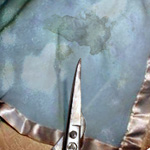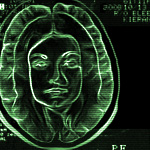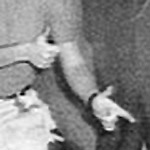 Well before I had a firm command of language, my best friend was a sky-blue blanket called “Meemuk.” Meemuk accompanied me wherever I went, clenched in my fleshy finger lobes, and with one corner of it typically providing me with some blankety nourishment.
Well before I had a firm command of language, my best friend was a sky-blue blanket called “Meemuk.” Meemuk accompanied me wherever I went, clenched in my fleshy finger lobes, and with one corner of it typically providing me with some blankety nourishment.
Other than the fact that it had a comforting scent, I don’t remember much about Meemuk now, and several old photographs provide the only corroborating proof that the item even existed. When I happened upon these photos during a holiday at home I brought them to my mother, whose nostalgic smile quickly turned to dismay. “Ugh. I could not get that thing away from you.”
“My blanket? Why would you want to?” I asked.
“Because it stunk to high heaven is why. You were obsessed with that blanket, even though it reeked, and was stained with who knows what.”
There was clearly a discrepancy between her memories of my beloved Meemuk and my own. Was she fabricating details to cover the onset of premature dementia? Of my blanket I had impressions of softness against my cheeks, and warmth, as well as that vaguely sweet smell I loved so much. These were my pure childhood images–surely she would not disabuse me of them.
“I don’t know what blanket you’re remembering, but Meemuk–you called it Meemuk–”
“I know.”
“–followed you into the dirt, and into the bathroom, and into your food. The only time I tried to take it away from you completely, you had such a fit that I eventually had to give it back to you.”
I shook my head in disbelief. “Well what do you expect?”
“But I had an idea, see.” And here’s where things took a dark turn. “I decided that if you wouldn’t let me take it away, I could at least borrow it long enough to wash it. As the weeks went by I would wash it regularly, and when it came out of the dryer I would cut just a little bit off the edges with a pair of scissors.”
“You didn’t!”
“Month by month,” she continued, “the blanket got smaller and smaller. It was so gradual that you didn’t even notice the difference.”
When the shock of her dark deed wore off I asked, “How small did Meemuk get?”
She rolled her eyes, already bored with the topic. “Oh I don’t know. A little larger than a napkin, I think.”
“Great Caesar’s ghost! You cut that much off and I didn’t notice?” But the humiliation at being so oblivious was only part of the reason I was upset.
“If you noticed you never made a fuss about it. And anyway, you were growing so quickly by then that everything probably seemed like it was getting smaller.”
The world was getting smaller all the time, it’s true, but she didn’t have to help it along, and with such sinister determination. I didn’t want to know what became of the last little patch of blue, so I dropped the photo back into the shoebox.
The shoebox full of cropped and trimmed photos.
I’m surprised that I hadn’t made the connection before then. I peered at another of the photos. There I was as a child, an anonymous arm over my shoulder that met an abrupt edge before the shoulder. Where was that, and who had been standing beside me? Another adult torso ends cleanly at a neck, the slice missing the top of my head by a hair. Over time the memories fade, and mom trims history back in strips. She’s a terror with the shears.
I call to her in the kitchen. “Mom?”
“Mmm?” Smoking.
“Didn’t I used to have a brother?”
 My mother removed her spectacles and studied them for a moment before dropping them into the breast pocket of her white overcoat. She never took that overcoat off, even in the evenings when she came home from the lab. “Okay,” she said, “I’ll tell you one thing about what I do, how does that sound?” Maybe I was too young to appreciate a more forthcoming explanation, but I had been persistent as only an eight year old can be. Inevitably the day came when she stopped to consider my question, rather than presenting me with the usual riddle, “a neuroscientist studies why you keep asking me what a neuroscientist studies.”
My mother removed her spectacles and studied them for a moment before dropping them into the breast pocket of her white overcoat. She never took that overcoat off, even in the evenings when she came home from the lab. “Okay,” she said, “I’ll tell you one thing about what I do, how does that sound?” Maybe I was too young to appreciate a more forthcoming explanation, but I had been persistent as only an eight year old can be. Inevitably the day came when she stopped to consider my question, rather than presenting me with the usual riddle, “a neuroscientist studies why you keep asking me what a neuroscientist studies.” In
In